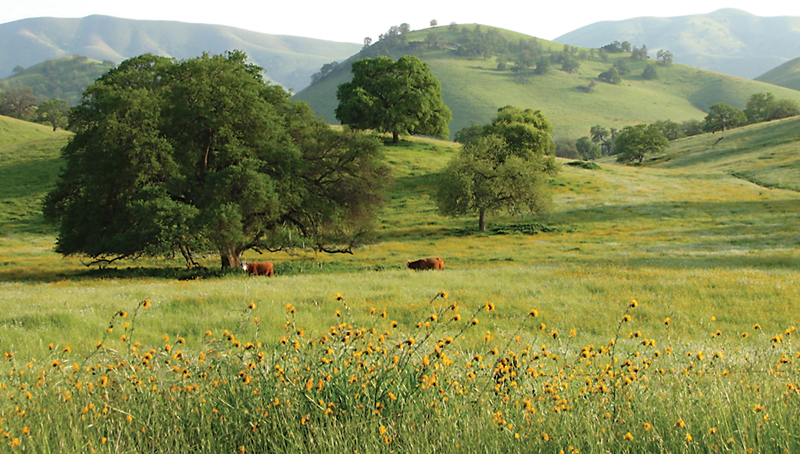J.G. Boswell Co. withdraws Yokohl Ranch project to build 10,000 homes east of Exeter
By Reggie Ellis
@Reggie_SGN
EXETER – A foothills area city that would have literally changed the landscape of Tulare County has been scrapped.
The J.G. Boswell Company notified Tulare County last week that it was formally withdrawing its application for Yokohl Ranch, a new city planned for development on 36,000 acres in the foothills east of Exeter and Lindsay. Addressed to Board of Supervisors Chairman Steve Worthley and CAO Michael Spata, the Jan. 31 letter said that despite a significant investment in the environmental impact report process over the last dozen years, the decision to end the project was no longer economically viable and inconsistent with the company’s agriculture interests.
“Our decision is based on very thorough analysis which indicates that market conditions and economic forecasts do not justify the financial investment necessary to develop and build out the Yokohl Ranch project,” wrote James W. Boswell, chairman and CEO of J.G. Boswell Company. “Also, this decision is consistent with J. G. Boswell Company’s strategic goal building shareholder value by directing our resources and efforts to our core agricultural businesses.”
J.G. Boswell Company, one of the largest private landholders in the Western United States, owns about 150,000 acres and is the country’s largest cotton producer and one of the world’s largest tomato growers. Once operated out of Corcoran, Calif. in Kings County, the company is now based in Pasadena, Calif. and had diversified into community building in the last half century. Del Webb began construction of Sun City, Ariz. on Boswell-owned property in 1960. The upscale retirement community eventually ballooned to more than 37,000 according to the 2010 Census. Boswell went on to create similar communities in 10 states, including Eastlake in San Diego County. Eastlake was formed in 1979 on 3,200 acres of land in San Diego County of the same name. The first resident moved into the community of Eastlake in 1986 and at last count an estimated 82,000 people lived in the community that is now part of the City of Chula Vista, Calif.
County Supervisor Kuyler Crocker, who represents District 1 which would have encompassed the Yokohl Ranch development, said the project was a “mixed bag” since being introduced in 2005. He said the project would have created jobs but faced major challenges in a tough regulatory environment. He said the project was delayed during the Great Recession and never really finished its draft environmental impact report after it was picked back up in 2014. About that time, Gov. Jerry Brown signed the Sustainable Groundwater Management Act (SGMA) requiring local agencies to draft plans that ensure watersheds create a balance between how much groundwater is used and how much of the underground water basins can be recharged. Boswell is the second largest holder of private water rights in California, including water rights on the Kings River but may not have been allowed to ship water from one river basin to another under the new law.
“SGMA may have played a factor but the environmental review process, including air quality and transportation, were also major issues for the project,” Crocker said.
If completed, Yokohl Ranch would have built more than 10,000 homes in the foothills between Exeter and Springville, making it the county’s fourth largest city with an estimated population of 30,000. It would have redrawn local, state and federal political boundaries, and changed traffic patterns in the eastern part of the county. Throughout the application process, J.G. Boswell Co. insisted that more than 60 percent of the 36,000-acre Boston Ranch would remain cattle grazing land.
“Throughout the process, we made and kept all of our commitments of ensuring visionary balance between land stewardship, sustainability and community development,” the letter from Boswell stated.
Laurie Schwaller of Three Rivers disagrees. As a volunteer with the now dormant Tulare County Citizens for Responsible Growth (TCCRG), Schwaller was one of the most vocal opponents of the project and the County General Plan that included the project. “I’m relieved and pleased. It was so inappropriate for our economy, community, environment and the health of our county,” she said. “They could not come up with any sound response to the heavily adverse effects on traffic, water supply, air quality and agriculture.”
TCCRG opposed the project from the beginning and said it would have irreversible and significant impacts in a county already suffering from the worst air quality in the nation and among the most severely overdrafted groundwater basin in the State. The group of residents argued that new growth in Tulare County should be focused around cities, where jobs and infrastructure to handle growth already exist instead of the “leap frog development” proposed by the J.G. Boswell Co.
Schwaller said unchecked growth in Tulare County has led to trickling rivers, a massive drop off in wildlife, the uprooting of Valley oak trees and the complete draining of the former Tule Lake, which once covered more than 13,000 square miles fed by the Kaweah, Tule and Kern Rivers.
“Each generation is less aware of the natural heritage here. They don’t realize there is no water in the rivers anymore, that the birds are all gone and that this was once home to the largest body of water west of the Mississippi River,” she said. “We have got to start acting responsibly with these resources on which we are all dependent.”
The 36,000-acre Boston Ranch will remain cattle grazing land and will continue to be operated by the Yokohl Valley Cattle Company, which has been in existence since Boswell first purchased the property in 1963. The company has made generous contributions to the its neighbors to the west over the years, including major donations to the Exeter Boys & Girls Club.
